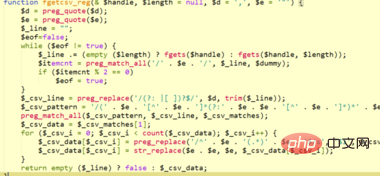Home >Backend Development >PHP Problem >When php reads csv, the solution to the problem of reading Chinese garbled characters
When php reads csv, the solution to the problem of reading Chinese garbled characters
- 王林Original
- 2019-10-15 17:55:135470browse

1、首先讲linux,不管是centos或者Ubuntu。在导入csv的php脚本文件头部加上如下代码:
setlocale(LC_ALL,array('zh_CN.gbk','zh_CN.gb2312','zh_CN.gb18030'));
这段代码的作用是改变脚本默认编码,因为操作系统的编码格式不是GBK所以,读取中文的时候会乱码。

2、接着讲windows,我们在读取csv数据的时候,会有一个while循环遍历每一行的数据,而读取的每一行数据,就需要我们进行转义,将中文编码读取出来。代码如下:
$row = eval('return '.iconv('gbk','utf-8',var_export($row,true)).';');
$row,就是读取出来每一行的数据变量。

3、最后,贴一个fgetcsv()方法的替代函数,这种是针对有些老版本的php该函数自带着一些bug的情况。如果上边两点还是没办法解决您的问题,您可以尝试一下使用该函数,与前边两点配合使用。
function fgetcsv_reg(& $handle, $length = null, $d = ',', $e = '"') {
$d = preg_quote($d);
$e = preg_quote($e);
$_line = "";
$eof=false;
while ($eof != true) {
$_line .= (empty ($length) ? fgets($handle) : fgets($handle, $length));
$itemcnt = preg_match_all('/' . $e . '/', $_line, $dummy);
if ($itemcnt % 2 == 0)
$eof = true;
}
$_csv_line = preg_replace('/(?: |[ ])?$/', $d, trim($_line));
$_csv_pattern = '/(' . $e . '[^' . $e . ']*(?:' . $e . $e . '[^' . $e . ']*)*' . $e . '|[^' . $d . ']*)' . $d . '/';
preg_match_all($_csv_pattern, $_csv_line, $_csv_matches);
$_csv_data = $_csv_matches[1];
for ($_csv_i = 0; $_csv_i < count($_csv_data); $_csv_i++) {
$_csv_data[$_csv_i] = preg_replace('/^' . $e . '(.*)' . $e . '$/s', '$1', $_csv_data[$_csv_i]);
$_csv_data[$_csv_i] = str_replace($e . $e, $e, $_csv_data[$_csv_i]);
}
return empty ($_line) ? false : $_csv_data;
}
推荐教程:PHP视频教程
The above is the detailed content of When php reads csv, the solution to the problem of reading Chinese garbled characters. For more information, please follow other related articles on the PHP Chinese website!
Statement:
The content of this article is voluntarily contributed by netizens, and the copyright belongs to the original author. This site does not assume corresponding legal responsibility. If you find any content suspected of plagiarism or infringement, please contact admin@php.cn
Previous article:How to define variables in phpNext article:How to define variables in php

